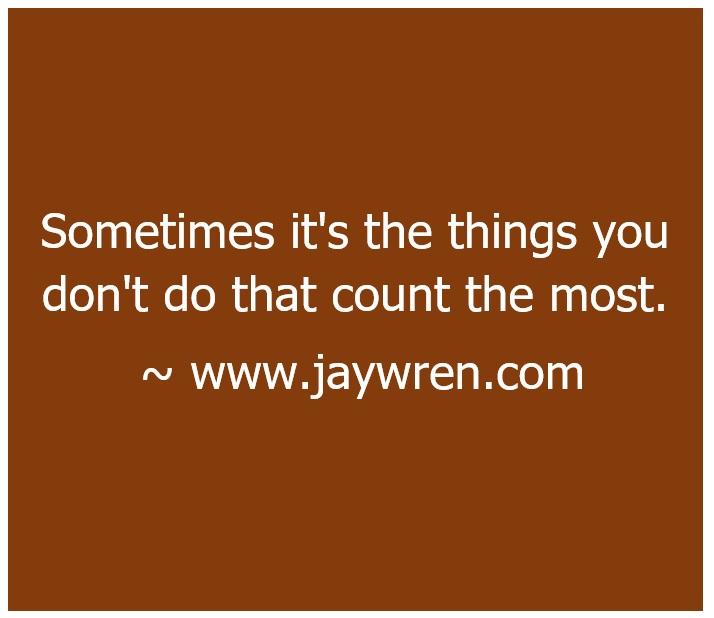inning Behavior: The things we don’t do are as important as the things we do to be a winner in the workplace. Here are eight things to avoid as you work to build a successful career and become a leader among your peers.
Sometimes it’s the things that you don’t do that count the most. ~ www.jaywren.com
The Pitfalls to Winning Behavior
Some of the pitfalls to winning behavior are habits that seem normal, but annoy others and detract from our accomplishments. I have been guilty of some of the things I am going to discuss. Seeing the harm of these habits has helped me become more engaged with other people and more mindful of their needs and interests.
In ways that I can’t measure, avoiding these behaviors has help me build relationships and increase my network.
1. Using Long, Uncommon Words
Building your vocabulary is a good practice. However, using big words to try to sound intelligent and impress people is phony and annoying. Furthermore, using long or uncommon words confuses people and detracts from your point.
It is narcissistic to throw around words that few people know or that people know as pretentious. You become like a person who poses in front of the mirror in a public restroom.
As a lesson about my own use of words that meant little but I used to impress others, my Mother once said to me, “You are so bombastic and I am so illiterate that you will have to elucidate for me to comprehend.” Lesson delivered, lesson learned.
2. Using Facilities and Parking for the Handicapped
People who need handicapped facilities have no choice. They need them when they need them.
Abusing the use of handicapped parking is not only annoying, it is illegal. Most states have stiff fines for using handicapped parking without legal authorization. Furthermore, most people have no tolerance for people who abuse the use of handicapped parking.
Restroom facilities become more challenging, because some locations only have one or two stalls. I have been in a one-stall restroom when a person in a wheelchair was waiting in line. The situation was awkward even though I had no choice. The best practice is, whenever possible, to defer to people who might need the handicapped facility.
3. Yacking on Your Cell Phone
There is something odd about strangers carrying on a conversation on a cell phone when they are next to you.
They have entered your space and are holding a conversation that doesn’t involve you.
I have been guilty of using a cell phone in a supermarket. As my wife gave me instructions on the things she wanted me to buy, I passed one shopper three times. The third time he suggested that I stop walking around talking on my phone and make a list.
This was an awakening to me just how easily cell conversations annoy the people around us.
Around the office, it is good to be aware when you are carrying on cell phone conversations around people who aren’t involved in the discussion.
4. Winning Behavior in Meetings
Texting and sending emails on a phone at the wrong time can be just as annoying.
At work, you can quickly annoy people, including people you need to impress. Look at the situation. You are in a meeting, and everyone is discussing the topic of the meeting. Your mind wanders from the discussion, and you suddenly feel the urge to send a message or read your email.
You mind tells you that you must deal with your priorities. However, you are creating a distraction for everyone in the room. People who are in a meeting are mentally like members in a marching band. They are in coordination. When you start texting or sending emails, you break step and become a distraction.
5. Blocking the Exits
Blocking the exits or any other passageway is annoying. Some people do not know how to navigate blocked hallways or aisles. Other people feel awkward asking to get past.
People often gather at the entrance to meetings or at the door when leaving. If this is a problem in your office, I recommend that the senior person in the room ask people not to block the door when they are leaving.
On the other hand, if you do need to get past people in a blocked passageway, simply say, “Pardon me.
6. Constant Complaining
Negative information creates bad moods. A constant flow of negative information destroys morale and increases turnover.
Everyone has problems. Solving those problems makes you look like a leader. Whining about those problems not only is annoying. It soon makes you look incompetent.
Instead of complaining, especially constant complaining, focus on solutions.
7. Self-Reference
Receiving credit for your work is a crucial step in the path to success. However, constantly talking about yourself is annoying and makes people see you as shallow.
If you are not receiving credit for the work you are doing. talk with your managers. Having them reference your accomplishments is far more effective than when you are doing it. Furthermore, avoiding this behavior has helped me build a strong network.
Additionally, give credit to other people for their accomplishments. People not only enjoy receiving credit. They often remember the people who helped them receive credit. This type of winning behavior will help you build a powerful network.
8. Trying to Be Funny
I remember an article that helped me know that not everyone understands the impact of their failed attempts at humor. The author started his article with religious jokes. These jokes were off topic.
The jokes weren’t clever. They were flippant. Furthermore, they distracted from the point of the article.
The author was undermining his own work, by not practicing winning behavior.
